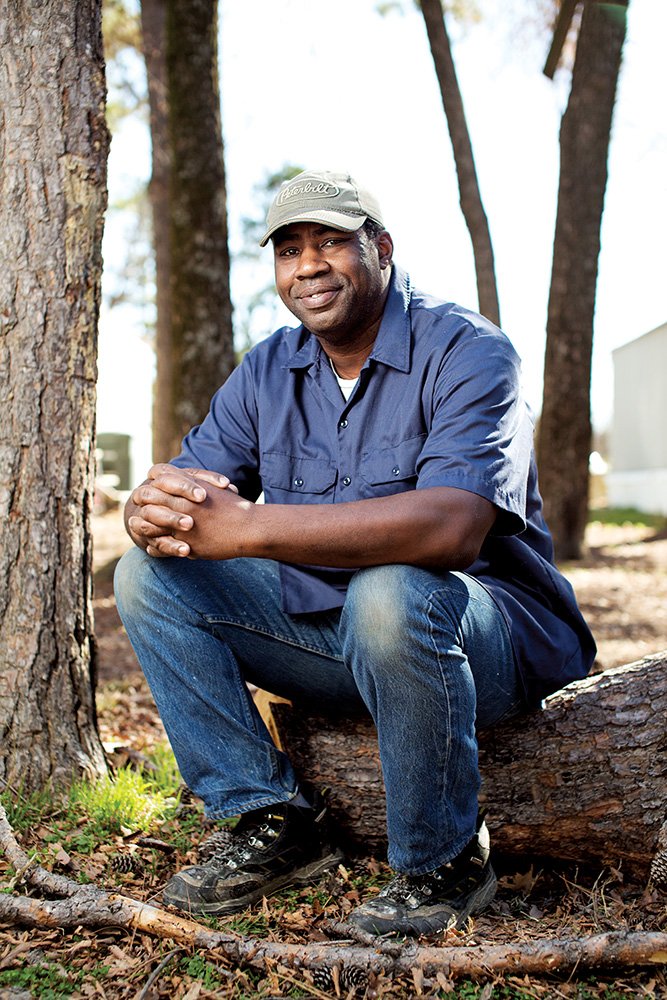Charles Abston said he never imagined that he’d be homeless, but for 1 1/2 years, he lived on the streets of Conway.
“It was horrible,” the 49-year-old said. “I slept on the street. I slept in the laundromats, anywhere I could find to rest my head. I slept in the park in the summer.”
He grew up in Lonoke and attended the University of Arkansas at Pine Bluff for one semester during the 1985-86 school year, he said.
Abston said that in about 2008, he was living in a Conway apartment and working for an oil-field company and “making pretty good money.”
“Then I met this lady, and she was very attractive, and she gave me her phone number without me asking,” he said. “We went out to dinner; we talked. She was very kind and professional.”
He said their relationship became serious, and she moved in with him because he “loved her so much.”
Abston said he didn’t know until later that she had a drug-and-alcohol problem.
“I made some pretty bad decisions,” Abston said, which contributed to him losing his apartment.
“Things got a little crazy, and that caused me to lose my job, No. 1. She had child support and no place to live. I was helping her pay child support. I was determined to make things right. I trusted her,” he said.
Abston said he thought she had a job, so he missed work and was fired.
“I ran out of money,” he said.
He said he ended the relationship with the woman in 2011, and he moved in with a friend who was a painter, and Abston worked for him occasionally.
Abston said he went to Bethlehem House, a transitional homeless shelter in Conway, and it was full. He didn’t try again to be accepted there, but he took a shower at the shelter each day.
“I ate once a day,” he said, which was the nightly meal served at the homeless shelter.
“It’s all about survival; it’s all about survival. I’m a strong person from the inside out, and I know how to survive,” he said.
“I was a tough person, and I experienced homelessness for the very first time, and it wasn’t very pretty. [I had] never been homeless in my life. It’s not the lifestyle I want.”
He said he lives in Oakwood Village, where City of Hope Outreach, referred to as CoHO, has its headquarters. Hope Shelter, which has a couple of beds available for homeless men, is in the mobile-home park, too.
“I realize in life there are quite a few homeless people around,” Abston said.
Abston was part of a panel discussion on homelessness for the kickoff of the Unseen Campaign, sponsored by City of Hope Outreach, a mobile-home-park ministry.
Phillip Fletcher, the founder of CoHO, said the four goals of the March campaign are to create awareness about the “unseen” in Faulkner County; educate Faulkner County residents on why people are homeless; create opportunities in which people can work throughout the year to make the unseen homeless visible; and support the work of the Hope Shelter.
Abston said that when he looked at the Unseen Campaign, he was reminded of himself.
He said people didn’t mistreat him when he was homeless — they ignored him.
“They didn’t treat me real bad. They never paid no attention; they paid no attention to me,” he said. “I was pretty hurt. I was hurt, you know. I guess it was a good part because I was riding a little bit too high, and God knocked me down.”
He said faith helped him survive.
“It was all about faith; I had a lot of faith,” Abston said. “Sometimes I was scared, but I was confident that God was watching me. God was watching over me and helping me out, and he helped my friend, too.”
Abston said the woman he previously lived with contacted him and apologized, and they are back together.
He said she has been sober for almost eight months.
Abston said he’s gotten to know Fletcher and other staff members.
“They’re really wonderful people,” Abston said. He said he participates in a one-on-one Bible study with a CoHO staff member.
Fletcher said Abston’s story is representative of many homeless people’s stories — breaking the stereotype that they’re all lazy or on drugs.
“They’re doing their thing, living their life, and then some situation happens that throws life off kilter, and then they have to re-establish themselves again, and that takes time,” he said.
Fletcher said Abston shows that “if you work hard and stick to it, change comes and new opportunities happen. He works hard. He uses our bike-share program for transportation. He sticks with it — a very humble man. I appreciate him.”
Abston said he works two jobs: one at an industrial laundromat and one at a fast-food restaurant.
“I’m a hard worker,” he said. “I will never be homeless again, not after what I’ve been through.”
Senior writer Tammy Keith can be reached at (501) 327-0370 or tkeith@arkansasonline.com.
